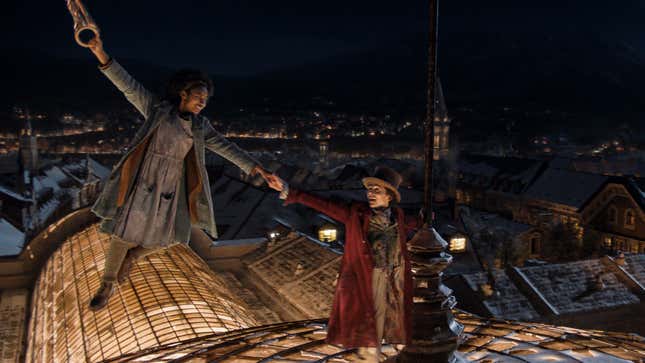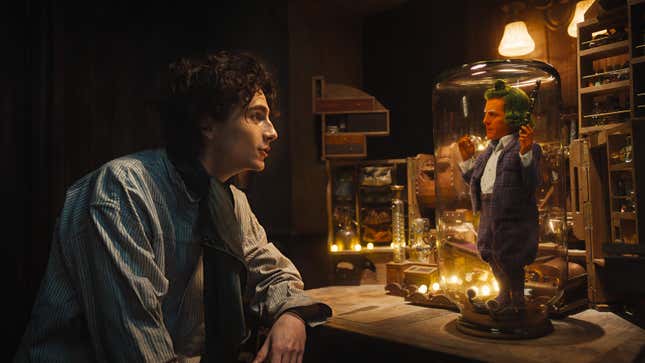Timothée Chalamet is reason enough to see Wonka, the new musical that acts as a prequel to the Roald Dahl-inspired films Willy Wonka and the Chocolate Factory and, if you’re so inclined, Charlie and the Chocolate Factory. Chalamet plays the famous title character in his formative years, passionate and optimistic about the world. He’s desperate for nothing else than to make chocolate and is infinitely charming in that pursuit. The performance is full of joy, wonder, and innocence.
Much of that carries across the film, too—which, as directed by Paddington and Paddington 2 helmer Paul King, one would expect. The world of Wonka is bright and exciting. Characters walk around with huge smiles on their faces, devouring sweets all throughout the day on sunny, colorful streets, blissfully ignorant to the fact a trio of chocolatiers (Paterson Joseph as Slugworth, plus Matt Lucas and Mathew Bayntonis) secretly control all the candy in the city.
That’s where Wonka gets a little wonky. The actual story of the film is that the young Wonka comes to Europe to make chocolate, but is first undercut by this “Chocolate Cartel” and then his illiteracy allows him to be swindled by local business owners (Olivia Colman, Tom Davis), leaving him with crushing debt that forces him into a life of service. Which sounds weird, right? Weren’t we talking about candy and happiness a few sentences ago? And isn’t this a musical? Yes, yes, and that’s the problem. Wonka’s whimsy doesn’t always work with its narrative.

There are times when both of those things, on their own, really work though. Much of the film’s charm comes from both Chalamet and the supporting cast surrounding him, who all 100% knew the assignment. The aforementioned Oscar-winner Colman is devilish as Mrs. Scrubbit, and the character’s chemistry with Davis’ Bleacher adds a fun throughline. Keegan-Michael Key is having a blast as the chief of police, a character who gains more and more weight the more corrupt he gets. Downton Abbey star Jim Carter leads Wonka’s fellow basement dwellers (along with Natasha Rothwell, Rakhee Thakrar, and Rich Fulcher), and while they start a little flat and goofy, they quickly become dynamic and endearing. Then there’s Joseph, Lucas, and Baynton as the villainous chocolate cartel, each of whom is basically channeling a supervillain from the 1960s Batman show. (Hugh Grant also plays an Oompa-Loompa in the film but the less we say about that entire storyline, performance, and effects, the better. Every time he or his related story appears, the film screeches to a halt.)
As for the more serious throughlines, those are personified by the character of Noodle, played by Calah Lane. Noodle becomes Wonka’s best friend and most trusted associate, and questions about her past add a welcome mystery to the film. Their friendship and partnership also give the film roots to sprout off the rest of its stories and themes. However, it’s always a little too sad when we recall her truth, which is that Mrs. Scrubbit and Bleacher have basically kidnapped her.
So, again, some of Wonka is serious, some of it isn’t, and then in the middle is the music by Neil Hannon (the Divine Comedy). The songs are incredibly catchy, well-written, and thoughtful, giving the film extra energy and emotion. There was a danger King could lean on them too much but instead, they’re weaved in quite well. Just when the film needs a little pick-me-up, a song arrives, and every time it feels right at home in the story.

And while Wonka’s imbalance can be seen as both positive or negative depending on the moment, there’s also a certain awkward expectation hanging over it all. Whether you know Willy Wonka as a book character, Gene Wilder, or Johnny Depp, we know that person as a fully-formed, confident, and by turns sad, weird, and cruel figure. That’s the inevitability of this character’s journey. However, none of that is found in Wonka, which treats the character as a jovial, genius, do-gooder at all times. As a result, you get the distinct and unfortunate sense this movie was developed with sequels in mind, holding back some of what you expect for the future.
It’s a feeling that paints everything good about the movie with a slight shade of disappointment. Yes, Wonka explains how this character became so enamored with chocolate and began his journey to the top. But so, so much is left unsaid or unlearned that you can’t help but feel admire the movie doesn’t live up to its full potential.
In the end though, there’s simply something to be said for a big, boisterous film featuring a massive star, with the sort of bells and whistles of a proper big-screen bonanza. Wonka is certainly that and, despite several glaring flaws alongside it, ultimately that charm wins out. It’s not quite a golden ticket. But maybe the bronze ticket isn’t that bad.
Wonka opens in theaters on December 15.
Want more io9 news? Check out when to expect the latest Marvel, Star Wars, and Star Trek releases, what’s next for the DC Universe on film and TV, and everything you need to know about the future of Doctor Who.

